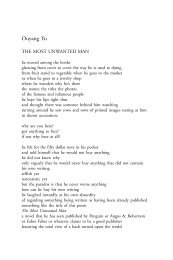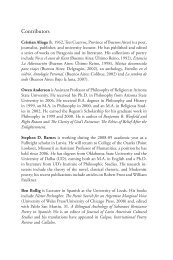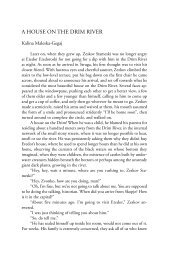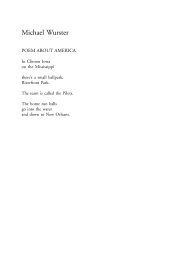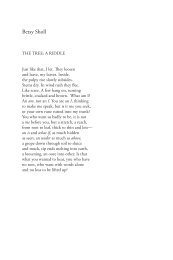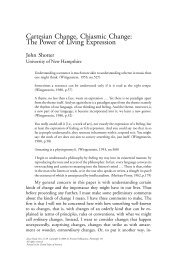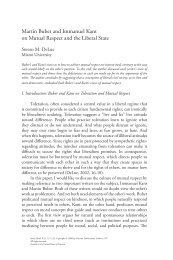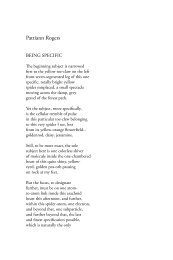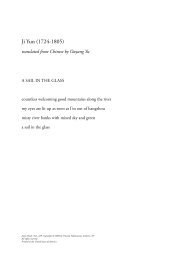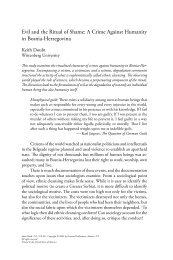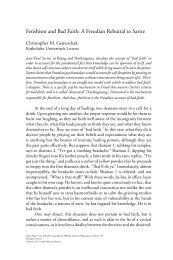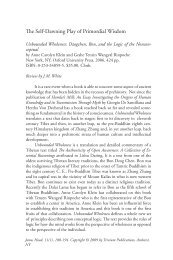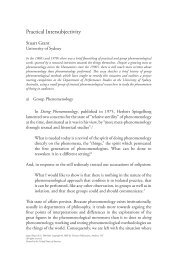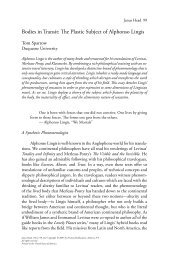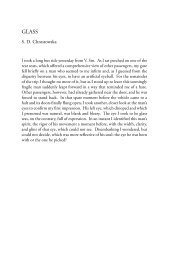Hesse's Steppenwolf: A Comic-Psychological ... - Janus Head
Hesse's Steppenwolf: A Comic-Psychological ... - Janus Head
Hesse's Steppenwolf: A Comic-Psychological ... - Janus Head
You also want an ePaper? Increase the reach of your titles
YUMPU automatically turns print PDFs into web optimized ePapers that Google loves.
140 <strong>Janus</strong> <strong>Head</strong><br />
When Pablo later returns to the booth, Haller perceives him as Mozart,<br />
one of the Immortals. �e theme of the Immortals and their realm has been<br />
constant throughout <strong>Steppenwolf</strong>. Even before coming upon the Treatise,<br />
Haller had momentarily visited the other world, “a cool and star bright”<br />
realm while listening to classical music. �e Treatise itself spoke not only of,<br />
but also from the perspective of the Immortals. Haller had encountered the<br />
Immortal Goethe in dreams, and in one of the Magic �eatre’s fantasies, he<br />
had conversed with Mozart. Goethe and Mozart figure as, what Northrop<br />
Frye terms, “chorus character”-- characters who give voice to the same perspective<br />
as the chorus and who are also involved in the action of the story.<br />
Pablo’s appearance as Mozart further reinforces his roles as wise man and as<br />
a psychogogue who moves back and forth between the novel’s two realms.<br />
In Pablo/Mozart the apparent dichotomy between jazz and classical music,<br />
between the sensual and the sublime is reconciled.<br />
�e “two world” motif is both a persistent element in comedy, stretching<br />
back to Aristophanes and continuing through Shakespeare to the<br />
present, and integral to Hesse’s chiliastic vision (to again borrow a phrase<br />
from Ziolkowski). In <strong>Steppenwolf</strong>, Hesse experiments with the traditional<br />
Christian version of this vision by rendering the simultaneous existence of<br />
the fallen world and the imaginal �ird Kingdom of the Spirit. �e vehicle<br />
of experimentation is, as has been noted, the technique of double perception<br />
which gives literary embodiment to the coexistence of the two kingdoms.<br />
<strong>Steppenwolf</strong>’s fallen world is divided into three separate realms, each<br />
with a different relationship to the world of the Immortals. �e bourgeois<br />
world has no inkling of the other realm. �e <strong>Steppenwolf</strong>’s isolated, subjective<br />
world of introspection and philosophical speculation glimpses the other<br />
world but lacks the vital constitution to sustain the vision. �e jazz world,<br />
on the other hand, acknowledges its deficient condition but proceeds to<br />
embrace life relying on homesickness for the other world as orientation for<br />
living in a fallen world. �is highly romantic view of the jazz world should<br />
not be taken as a literal advocating of drugs, prostitution, etc., but rather<br />
as a metaphor for the embodied imagination--an imagination that sees the<br />
immortal in and through the finite. Pablo and Hermine are agents of this<br />
imagination and the role of the Magic �eatre has been to initiate the <strong>Steppenwolf</strong><br />
into its workings.<br />
�e archetypal pattern of comic action begins in the distress of the fallen<br />
world, moves into the other world in which there is a metamorphosis which<br />
is the comic resolution, then goes back into the normal world. <strong>Steppenwolf</strong>



